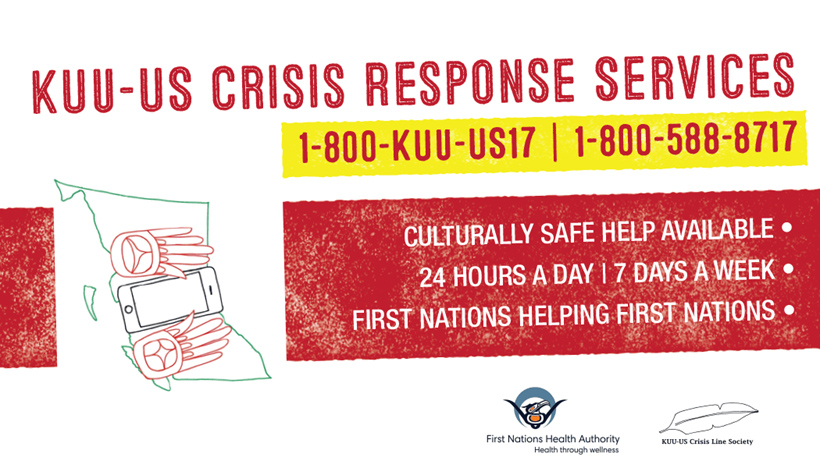

COAST SALISH TERRITORY (Vancouver, BC) – A partnership between the First Nations Health Authority (FNHA) and KUU-US Crisis Response Services will result in additional culturally safe crisis line support services for First Nations and Aboriginal people in BC.
Available 24-hours a day, seven days a week, regardless of where individuals reside in the province, those in need of support can call 1-800-KUU-US17 (588-8717) for an immediate response.
"KUU-US has developed an excellent culturally safe approach for working with our people before, during and after crisis. In light of Canadian Mental Health Awareness Week, the FNHA is excited to partner with KUU-US to make this service more widely available, especially for those living in small and remote communities," said Joe Gallagher, Chief Executive Officer of the First Nations Health Authority.
KUU-US services are for First Nations, by First Nations - all crisis response personnel are certified and trained in Indigenous cultural safety and therefore bring an understanding of First Nations history and trauma from the residential school to their roles. Last year, KUU-US helped over 10,000 individuals with mental health issues and crises related to residential school, child welfare, addiction, health concerns, divorce/separation, suicide ideation/survivorship, grief/loss, crime, abuse, peer pressure and financial distress.
Stigma often prevents individuals from accessing local mental health supports and services, particularly in small and remote communities where individuals are hesitant to share personal matters with someone they potentially know from the community.
This partnership combines KUU-US' 20 years of First Nations crisis-response experience with FNHA's extensive on-the-ground regional networks to provide an efficient mechanism to support First Nations and Aboriginal individuals in crisis to more quickly connect to services through after-crisis care plans and follow-up.
"KUU-US is unique to other crisis centres, in that we track and monitor 'at risk' individuals and establish a support (wrap around) service. This involves making daily calls until the person is no longer in crisis and is linked into support resources. We also seek out individuals that are identified by others in need of support (family, friends, counsellors, teachers, first responders)," said Elia Nicholson-Nave, Executive Director, KUU-US Crisis Response Services. "This is all about reducing crisis' in Nations and working together to assist individuals along their wellness journey. We are excited about the partnerships formed with FNHA and their commitment to helping us to help others!"
Since 1993, KUU-US Crisis Response Services have provided culturally safe services to First Nations and Aboriginal people on Vancouver Island. Services are free and confidential and include direct 24-hour crisis phone services, risk assessments, safety monitoring, aftercare and mobile crisis response in the Port Alberni region.
Through the partnership, crisis response protocols will be established for all five Regions in BC. Regional and provincial sessions will bring all health partners together to establish linkages to services province-wide. FNHA has invested $400,000 to make KUU-US services more widely available to all First Nations and Aboriginal people across the province.
Media Contact:
First Nations Health Authority
604.831.4898
Media@fnha.ca
About KUU-US:
KUU-US is a registered non-profit charity that was established in 1993 due to the high rate of suicide attempts and completions that was occurring amongst Nuu-Chah-Nulth communities. A meeting was held representing various nations, front line emergency personnel and concerned community members to address the issue of suicide. KUU-US means "people" in Tseshaht language. KUU-US is an accredited agency of the American Association of Suicidology.
KUU-US has an adult/elder line (250-723-4050) and a child/youth line (250-723-2040).
Both can be accessed through 1-800-588-8717.
Download this media release in PDF format here (148 KB)

